Daily Flyer - January 26, 2024
A voice of Ukraine to the West

Bodies of 77 fallen Ukrainian defenders brought back to Ukraine
On January 26, the bodies and remains of 77 fallen Ukrainian defenders were repatriated to Ukraine and will be handed over to forensic experts for identification. The repatriation event was a result of extensive cooperation between the Coordination Headquarters for the Treatment of Prisoners of War, the joint center at the Security Service of Ukraine, the Interior Ministry, the Armed Forces, the State Emergency Service in Sumy Oblast, the State Border Guard Service, and other agencies in Ukraine's security and defense sector. The preparations for the repatriation event had been ongoing for an extended period, and the fallen defenders will be transported to designated governmental specialized institutions for identification. The Coordination Headquarters expressed special gratitude to the International Committee of the Red Cross for its support.
Russians damage 62 historical heritage facilities in Kharkiv

On January 23, 2024, during one of the largest-scale Russian missile attacks on Kharkiv, significant damage was inflicted on the city's historical area, affecting 62 historic buildings. HeMo: Ukrainian Heritage Monitoring Lab reported that among the damaged structures, 20 are architectural monuments, and sites for inclusion in the list of architectural monuments are recommended. The attack, documented by the HeMo Lab team, resulted in the most extensive damage during the full-scale invasion, with about 50 sites being damaged for the first time.
The affected districts included Zalopan, where houses from the 18th and 19th centuries are located, and the central part of Kharkiv, featuring buildings from the late 19th and early 20th centuries. The National Academy of Legal Sciences of Ukraine, constructed in 1896 by Serhii Zahoskin, sustained significant damage, with the explosion causing the collapse of roofs, floors, and walls. A subsequent fire further exacerbated the destruction.
In total, 62 cultural heritage sites experienced damaged glazing, and over 35 suffered harm to interior decoration, roofs, and structural cracks, posing a threat to their further deterioration due to the progression of cracking and exposure to rainfall. Notably, the damaged buildings included structures vital for the city's social and cultural life, such as the National Academy of Legal Sciences of Ukraine, the Annunciation Cathedral, the Regional Organisational and Methodological Centre for Culture and Art, and the Kharkiv Medical Society. The Russian missile attack on Kharkiv on January 23 claimed the lives of ten people.
Russian Attacks Overnight Hit Myrnohrad and Kherson: Seven People Wounded, School, Shopping Center, and Kindergarten Damaged

Overnight attacks by Russian forces targeted the Ukrainian cities of Myrnohrad in Donetsk Oblast and Kherson, resulting in injuries to seven people, including two children. The assaults caused widespread damage, impacting apartment buildings, shopping centers, a school, a kindergarten, and an administrative building.

Kherson Oblast Military Administration Head, Oleksandr Prokudin, reported that Russian forces utilized their S-300 air defense system to launch two missiles at Kherson. The resulting explosions damaged a kindergarten, an apartment building, and a shopping center. A 54-year-old woman sustained injuries, including a leg wound, while at home during the attack.

In Myrnohrad, six people were injured, with two children among them. While one person required hospitalization, the others sustained minor injuries. The missile strike destroyed an administrative building and caused extensive damage to several buildings, including a school, shopping center, and numerous private homes.
The attacks underscore the ongoing threat to civilian life and infrastructure amid the conflict, prompting condemnation from the international community. Authorities are assessing the extent of the damage and providing necessary medical care and support to those affected.
The death toll of 23 January attack on Kharkiv rises to 11 people
A woman who was injured during Russia's missile attack on Kharkiv on the morning of 23 January died in hospital on the night of 25-26 January. The death toll from the strike has therefore increased to 11.
Russia rejects international investigation into Il-76 crash according to Defence Intelligence of Ukraine
In the aftermath of the recent crash of the Russian Il-76 military transport plane in Belgorod Oblast, the international community is grappling with conflicting narratives and a lack of concrete evidence. Despite Russia's claims that the plane carried Ukrainian prisoners of war, the United Nations Security Council remains skeptical, with Deputy Secretary-General Rosemary DiCarlo stating that the UN couldn't verify the reports from either side regarding the cargo or the circumstances of the crash.
Andrii Yusov, spokesperson for Ukraine's Defence Intelligence, emphasized the absence of clear evidence supporting Russia's version of events. He pointed out the historical context, highlighting the military aircraft's previous involvement in transporting Russian weapons and personnel. Notably, Russia did not inform Ukraine about the intended use of the Il-76 for transporting Ukrainian prisoners of war.
As calls for an international commission to investigate the incident grow louder, Russia has adamantly rejected the demand. Yusov stressed the importance of such a commission to thoroughly examine the remains of the aircraft, scrutinize the black boxes, and carefully analyze the crash site to determine the true cause of the downing. Despite Russia's resistance, the need for transparency and an unbiased investigation remains paramount.
Against the backdrop of this controversy, the intended large-scale exchange of prisoners on January 24 was disrupted, marking another chapter in Russia's attempts to exploit the issue of prisoners of war for provocative purposes. Despite the challenges, Ukraine remains committed to the safe return of its defenders and civilians from Russian captivity, navigating a complex geopolitical landscape with resilience and determination.

